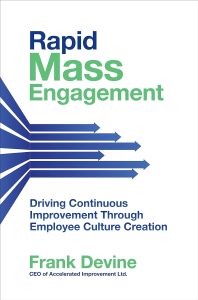By Frank Devine, below, culture change expert and author of ‘Rapid Mass Engagement: Driving Continuous Improvement through Employee Culture Creation’#
 My work involves the creation of employee-owned yet high-performing and continuously improving cultures. Why is asking ‘why?’ necessary and why is it insufficient?
My work involves the creation of employee-owned yet high-performing and continuously improving cultures. Why is asking ‘why?’ necessary and why is it insufficient?
- Employees Can’t be Mandated to Engage!
We all exhibit discretionary effort in our lives but we choose when we do this. Organisations compete for a share of that discretionary effort, it is not there by right. Creating a set of top-down values has merit but it does not create discretionary effort especially when employees receive these as commandments from on high. To earn the discretionary effort and emotional commitment of entire workforces we have to do so much more including answering the question ‘why should we do this?’
Answering that question is why the Rapid Mass Engagement of entire factories, warehouses and offices involves an understanding of a Higher Purpose that reaches employees at emotional not just logical, levels. In the words of a famous old beer advertisement, it has to reach places other beers don’t reach!
- Buy-in to Operate at World-Class Level Requires Understanding Why a Technique or a Skill is Effective
It is not enough to tell employees a study revealed x, y and z. Employees and managers are intelligent; when operating in globally competitive markets they soon learn to test and validate what they are being taught. When operating at stress in these markets employees learn to be numerate, they learn how to test hypotheses and validate findings, they learn how to collect accurate data and how unreliable small sample size studies are, they become statistically literate. Deepening all of these skills is itself key to success for SMEs supplying globally competitive customers.
Skill in these areas grows slowly through practice and experimentation. This requires patience and diligent systematic work within a proven framework. As an example, leadership training needs to pass the validity test; for managers to buy-in to my approach to recognition and constructive feedback they need to understand the Pareto analysis that explains why these conversations go off track. Once they understand how we discovered what was going wrong, they buy-in to focusing on the top 2/3/4 reasons (depending on where the Pareto break was) and how specifically to predict and prevent this happening in their own conversations.
- If We Don’t Understand Why Our Brains can be a Barrier, Our Brains will Continue to be a Barrier!
If you want an employee-owned yet high-performance and continuously improving culture, the coaching and facilitation skills of your managers, need to be systematically effective.
This cannot happen unless they understand the key mistakes our brains habitually make when diagnosing situations. It also cannot happen if they are not trained in proven and powerful techniques for overcoming these naturally occurring and powerful barriers exposed by Kahneman’s “Thinking Fast and Slow”. G.R.O.W, the most used coaching model in the English-speaking world, is simply not designed to address these diagnostic and validation weaknesses.
This in turn is impossible if your coaching model is an elite one expensively training a few specialists; much better is training every employee inexpensively!
- Simply Asking Why is Necessary, but not Sufficient
‘Why’ is not the only important question. It is powerful especially when a part of a systematic diagnostic process, but it is only one option.
We can all think of powerful questions that could have changed outcomes:
- Imagine if someone had asked ‘is closing schools the only way to limit Covid transmission?, couldn’t we move the classes outdoors instead?’
- Imagine if someone had asked IBM ‘are you sure no-one will want a personal computer?’
- Imagine, prior to a damaging decision in your organisation, if someone challenged the most senior leader in the room by asking ‘is this the only way of achieving our objectives?’
None of these questions involved asking ‘why’ nor are they open questions. Both open and closed questions are effective when used at the right time.
The key knowledge and skill is asking the right questions in the optimum sequence; ‘why’ is simply one of those key questions. Key also is knowing when you should not ask a question. For example, asking an employee ‘why did you do that?’ after a quality incident will lead to defensiveness. Far better to calmly ask the employee to ‘talk me through what happened’, ideally guided by an employee-owned culture that specifically prevents blame but encourages accountability.
 Frank Devine is a culture change specialist, founder of Accelerated Improvement Ltd. and author of Rapid Mass Engagement: Driving Continuous Improvement through Employee Culture Creation. He is co-hosting a workshop on how to achieve rapid operational and culture change in January 2024. For more information, visit www.manufacturersnetwork.co.uk/making-the-leap-rapid-process-culture
Frank Devine is a culture change specialist, founder of Accelerated Improvement Ltd. and author of Rapid Mass Engagement: Driving Continuous Improvement through Employee Culture Creation. He is co-hosting a workshop on how to achieve rapid operational and culture change in January 2024. For more information, visit www.manufacturersnetwork.co.uk/making-the-leap-rapid-process-culture


